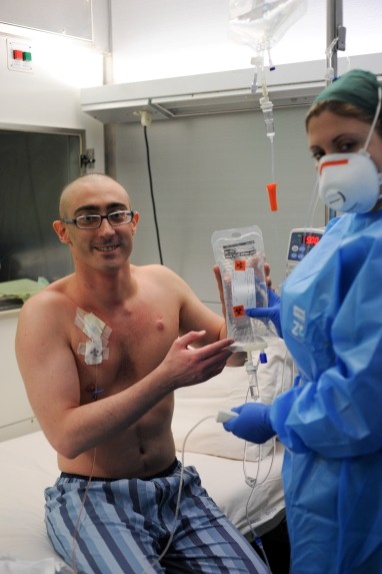This term is very often used to identify a type
of treatment aimed at fighting different types of
cancer, including leukemia, the cancer of the bone
marrow and blood. There still remains some confusion
about what chemotherapy exactly is.
This article aims at clarifying what chemotherapy is
and what it is for, which drugs it is composed of,
how they work and what are their main side effects,
and finally at giving some advice on how to
effectively manage these side effects.
As I am used to do on this ‘blog’ side of Beat
Leukemia, I wrote this article drawing from my
personal experience, and what I saw happen to other
patients very often. I hence invite you readers to
answer leaving comments at the end of the page,
especially if you know of other side effects and how
to deal with them.
Chemotherapy is a group of drugs used to destroy
cancer cells, according to well defined protocols
for each tumor type, and adapted to the single
patient alongside parameters such as age, weight,
and general health conditions.
Chemotherapy drugs can be given in different forms,
and precisely:
- Intravenous, through a peripheric or central
venous catheter (CVC);
- By means of injections, in muscles or below skin;
- Orally, with pills.

Picture: Chemotherapy infusion through central
venous catheter (CVC).
These drugs attack and destroy the cancer cells
during several phases of their development.
Unfortunately however, they are not able to
distinguish cancer cells from the healthy ones and
this large scale bombing gives place to a number of
side effects for the patient.
Every day our body’s cells, especially “rapid
replications cells”, die and are substituted by new
ones that are continuously produced in the lower
layers. It is the case for instance of the skin, or
hair. Chemotherapy has the effect of temporarily
blocking the production of new cells, so once the
superficial ones are dead, there are no new ones
ready to replace them. These leads to the skin
peeling off (in the case of skin), something similar
to a sunburn. When this happens inside the oral
cavity, this is called “mucositis” and can cause
strong pain in the mouth and throat, making it
impossible to swallow any food or beverage.
Mucositis often affects also the stomach, causing
nausea, vomit and loss of appetite, the intestine
causing diarrhea, and the end of the intestine,
making it possible for hemorrhoids to appear.
Which of these effects will appear and with what
intensity depends on several factors such as the
dose of chemotherapy taken, the type of drug used or
the number of cycles already done before. Every
patient can anyway react in a different way. The
side effects of chemotherapy tend to accumulate and
get heavier, and it takes time before they are
eliminated by the body.
Concerning nausea, there exist today many very
effective anti-nausea drugs that are given to the
patient right before the chemotherapy or if
necessary. The chemotherapy itself has been modified
in time to reduce this side effect as possible. It
can still help to eat light before or during the
infusion of the drugs, and try to eat smaller
quantities, more often.
Intestine issues can be managed with anti-diarrhea
drugs. Concerning hemorrhoids instead it can be
useful to ask for the visit of a specialist that can
suggest a therapy to prevent them to be started
before the chemotherapy.
The oral cavity is interested when the chemotherapy
is very intense. Nothing can be done to cure
mucositis, but it is possible to remove the pain
with pain killers, and prevent complications such as
bacterial infections with a careful oral hygiene,
matching the use of a soft toothbrush with an
effective combination of different mouthwash.
Chemotherapy also has side effects on the
reproductive system. Nothing to do with the
possibility of having sex, which must still be
protected with the use of condoms, and matched with
a careful hygiene of the body, particularly the
genital area. Chemotherapy can instead compromise,
temporarily or permanently, fertility, that is the
ability to reproduce. It is hence important to get
informed with your doctor, if the seriousness or
urgency of the disease allow for it, BEFORE starting
treatment, about the possibility to preserve a
sample of sperm or ovules with the methods that are
available today.
www.beat-leukemia.org
Fondazione Beat Leukemia Dr Alessandro Cevenini - CF 94618790151 | Legal Notices | Realizzazione sito web: Progetto Web

















